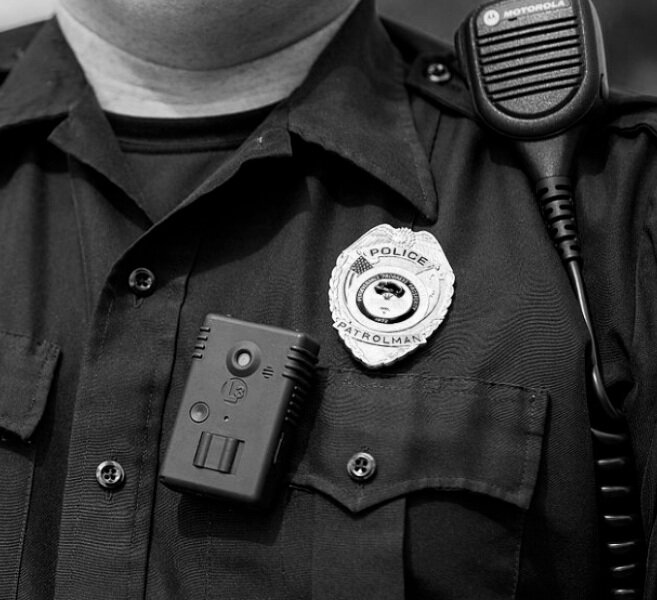
Five years ago, body-worn cameras were the latest in a long line of products and services being held up as a panacea for policing. Adopting body-worn cameras, it was believed, would inevitably build public trust, improve the behavior of officers and community members, and provide comprehensive answers to important questions about critical incidents, especially regarding the use of force. The expectations for body-worn cameras far exceeded their reality, another example of the “magical thinking” that plagues policing and police reform efforts in the United States.
The past five years have clarified the practical benefits and limitations of police body-worn cameras. Having studied, written on, and provided extensive training to law enforcement and legal audiences, I can say with conviction that body-worn cameras are a tool. As with any tool, how they are used matters significantly more than whether they are used. When it comes to the potential benefits of a police body-worn camera program, the devil is in the details.
One of the difficult and controversial issues that police agencies must address is whether officers will be permitted to review their own video footage, or that of other officers, prior to writing their reports or making a statement. The “pre-report review” question has given rise to an entire spectrum of answers.
On one side is the Police Executive Research Forum, which has taken the position that officers should be allowed to review video footage prior to writing a report or making a statement. On the other side is the American Civil Liberties Union and National Association of Criminal Defense Attorneys, which generally oppose pre-report review. Both positions reflect a desire to ensure in ensuring that officers’ reports are complete and accurate despite the sharp disagreement on how best to do so. Reports, after all, are how front-line officers communicate information to investigators, prosecutors and defense attorneys, judges, and the general public.
This issue is complicated by what the best available evidence tells us: pre-report review can both enhance and undermine accuracy.
It can enhance accuracy by allowing an officer to paint a more complete picture of events than they, personally, were aware of. When multiple officers investigate a single incident, often a single officer—the “primary” officer—does the report, relying on and documenting information provided by the other officers. The primary officer responding to a complaint about a burglary, for example, may speak to the victim while the other officers interview the neighbors. In preparing a report, the primary officer will rely on their own notes and information from their fellow officers.
Many police reports are based on far more than the authoring officer’s unaided memory of their own personal observations. Often reports are compilations of accurate information gathered by a number of different officers from several different sources. If the primary officer’s written notes, information orally provided by other officers, the written notes of other officers, still photographs, et cetera, can enhance the accuracy of an officer’s report, then the same would certainly appear to be true for body-worn camera footage.
Additionally, there is empirical evidence that suggests that reviewing video may serve a mnemonic function. In one study, researchers outfitted participants with a “SenseCam,” an outward-facing, body-mounted camera that takes periodic still images (but not video); when wearers reviewed the images, they were able to better recall details about the relevant event even when those details were not reflected in the images themselves. The SenseCam study suggests that reviewing a video of an incident will help officers accurately remember and report details beyond just those that appear on camera.
In the same vein, a study from the Netherlands – an early adopter of police body-worn cameras – found improvement in both quantity and quality of reports when officers could review body-worn camera footage prior to writing them compared to those who could not review said footage.
At the same time, however, pre-report review can undermine accuracy by facilitating officer gamesmanship or unconsciously altering officers’ memory of relevant events. Most obviously, officers can lie, building a false story around what is visible—or, equally important, not visible—on camera. This is not to suggest that officers are always nefarious, but instead merely that they are human. Consider an example that I’ve used before:
To the extent that deception occurs, it may well occur in some occasions as a result of the officer being put in a moral dilemma. . . . [A]n officer . . . is interacting with a bellicose subject and notices, out of the corner of her eye, the subject ball his hands into fists. Fearing an attack, the officer preemptively uses force, bringing the subject to the ground. Upon reviewing the video, however, the officer sees that the subject’s hands, more clearly visible in the video than in her peripheral vision, were never balled into fists after all. What is that hapless officer to do? Ideally, perhaps, the officer would document her perceptions as well as her knowledge that her perceptions were inaccurate. Officers are only human, however, and it is entirely plausible to suspect that some number of officers in that position would leave out any mention of balled fists and instead find something in the video that they could use to justify their actions.
One need not focus on conscious deception to be concerned about the effect of pre-report review on accuracy. Memory science has established that human memory is fallible; an individual can believe, in good faith, that they can accurately remember an event when, in fact, their memories are not accurate.
As psychologist Elisabeth Loftus described, “We can’t reliably distinguish true memories from false memories.” Consider, for example, the last time you got into an argument with a significant other about whether you (or they) did or did not do something or say something. You might have asserted, honestly and confidently, that they did something. They might have asserted, honestly and confidently, that they did not. Both of you might truly remember what you’re asserting, yet at least one of you is wrong – and it’s possible that you both may be.
If memories can be changed without the individual being aware of it, as seems undeniable, reviewing video footage of an event risk altering an officer’s memory. As one study described:
Theories of reconsolidation note that whilst reactivation of an event in memory through re-exposure can enhance recall, it can also render that memory susceptible to modification and distortion (misinformation effect). Similar to other witnesses or the media, body-worn video provides an alternative perspective to the event they attended. However, the specific content shown on video may determine precisely what is recalled or forgotten.
If a pre-report review can both enhance and undermine the accuracy of officer reports, what policy is the hapless policy agency to adopt? They could, of course, permit or prohibit pre-report review without regard for the negative side effects, but two more nuanced options present themselves.
Agencies could prohibit officers from engaging in pre-report review but allow officers to review video after writing an initial report and then to supplement their initial report as necessary. The Netherlands study found reports written under this “report, review, revise” approach were similar in terms of quantity and quality to reports written with a pre-report review.
Separately, agencies could permit pre-report review in some circumstances but prohibit it in others – most obviously in the context of use-of-force reports. For a burglary report, an officer’s memories of what items were stolen or what time the neighbors got home are not important; what matters is what items were actually stolen and what time the neighbors actually got home. The use of force, however, is different. As I’ve written elsewhere, “The propriety of a use of force does not turn on the objective facts of the situation, but on the reasonableness of an officer’s perceptions and actions.” What actually happened matters, obviously, but evaluating the use of force—a topic I’ve written extensively about—requires a thorough understanding of the officer’s contemporaneous perceptions.
Two additional considerations should lead agencies to hesitate before permitting pre-report review in the use-of-force context. First, allowing officers to rely on video footage may encourage courts to do the same. When use-of-force cases are litigated, the constitutional question is whether an officer’s actions were objectively reasonable. As the Supreme Court wrote in Graham v. Connor, “The ‘reasonableness’ of a particular use of force must be judged from the perspective of a reasonable officer on the scene.” When police agencies normalize pre-report review, however, they make it more likely that courts will review the reasonableness of a use of force from the perspective of the camera on the scene. After all, if police agencies and individual officers rely on video footage instead of officers’ perceptions, they can hardly object to courts doing the same.
Second, pre-report review may invite unnecessary controversy. Police legitimacy suffers when the public perceives officers as benefitting from special protections that other community members do not enjoy.
Imagine a store owner uses deadly force to shoot an armed would-be robber. Despite the apparent lawfulness of the store owner’s actions, they will not be allowed to review security video footage before being interviewed and providing a statement. Allowing an officer to do in an equivalent situation can create an appearance of preferential treatment that may undermine public trust.
Furthermore, although advocates of pre-report review are understandably concerned about discrepancies creating doubts about individual incidents, most discrepancies are easily explained; effectively everyone agrees that it is unrealistic to expect human memory to be perfect, especially in high-stress situations. Pre-report review can create a bigger problem; when the inevitable audit compares use-of-force reports to incident videos, the complete absence of discrepancies will cast doubt on all of the reports.
The issue of pre-report review is challenging, multi-faceted, and potentially divisive, but it is also a critical component of a comprehensive body-worn camera program.As agencies work with stakeholders, including both rank-and-file officers and community members, to develop or revise their body-worn camera policies, they should rely on the best available evidence to determine which procedures will meaningfully enhance public trust and improve the professional delivery of police services.
______________________________________________________________________________________________________________________

Seth Stoughton
Seth Stoughton is an Associate Professor at the University of South Carolina School of Law and an affiliate Associate Professor in the Department of Criminology and Criminal Justice. He is a former police officer and the principal co-author of Evaluative Police Uses of Force.
______________________________________________________________________________________________________________________






